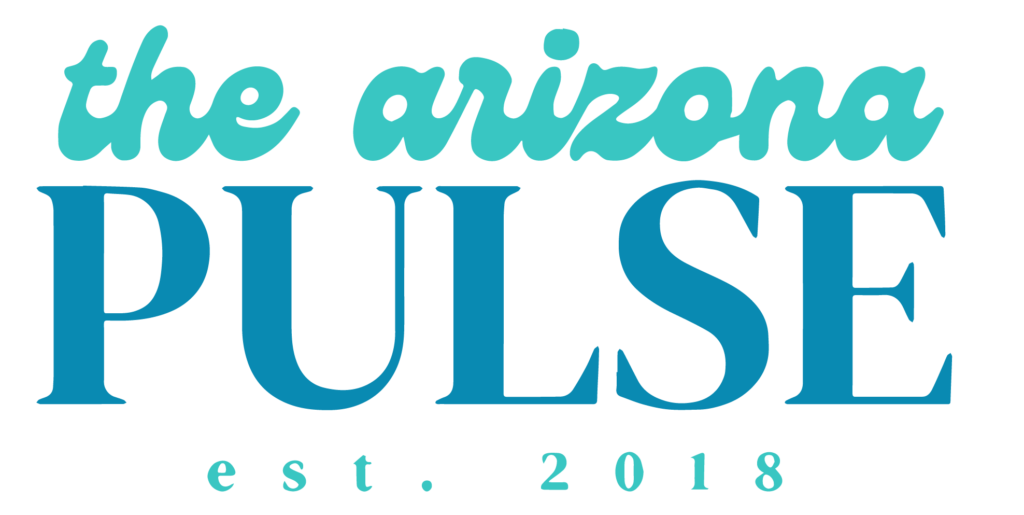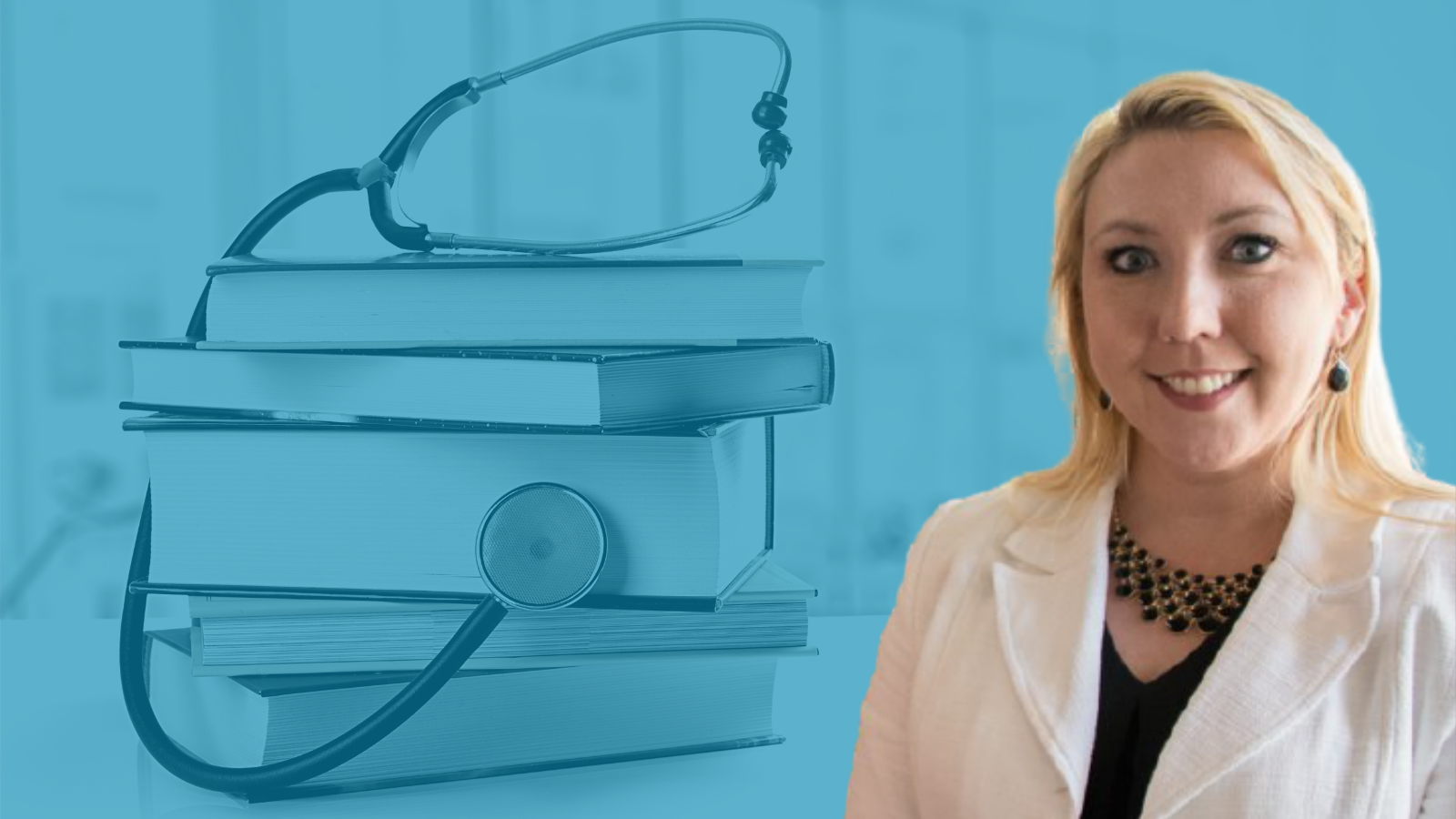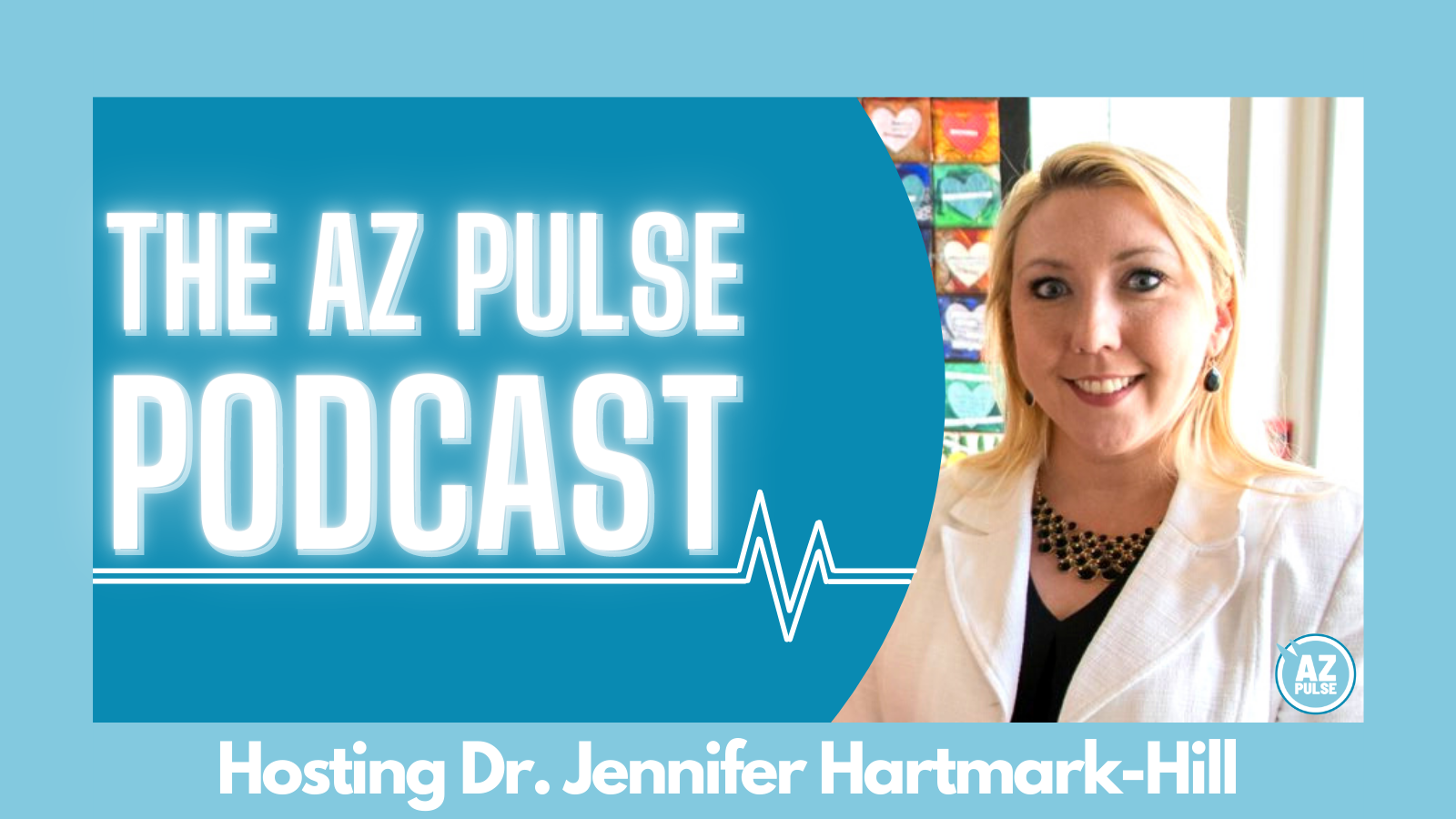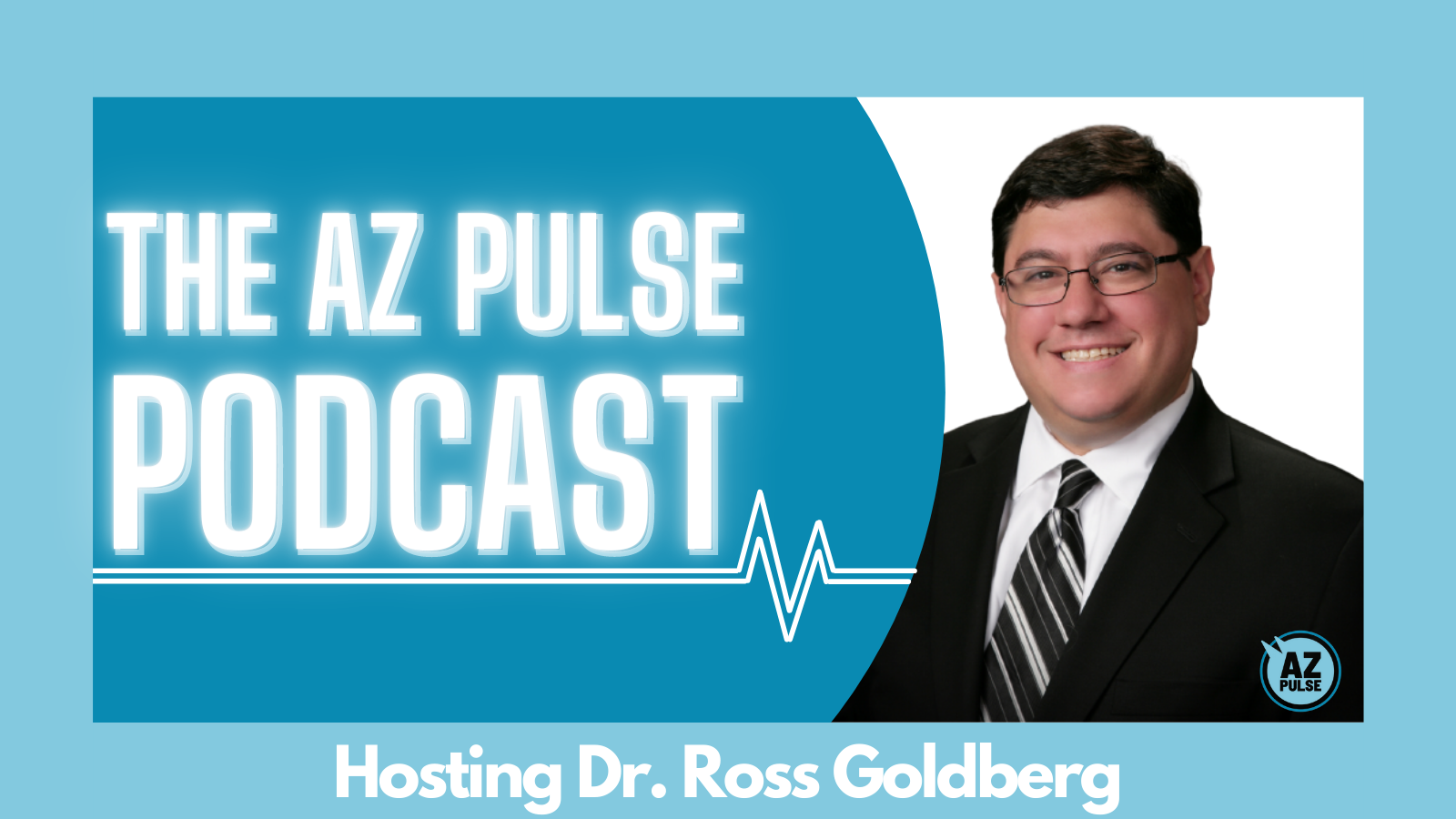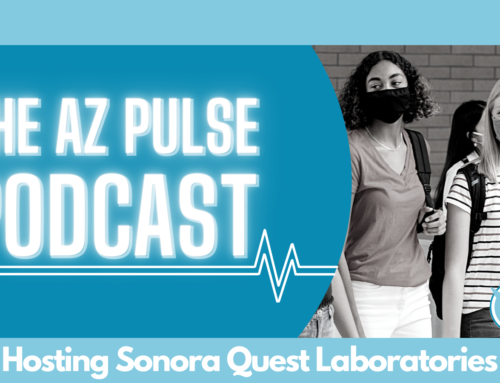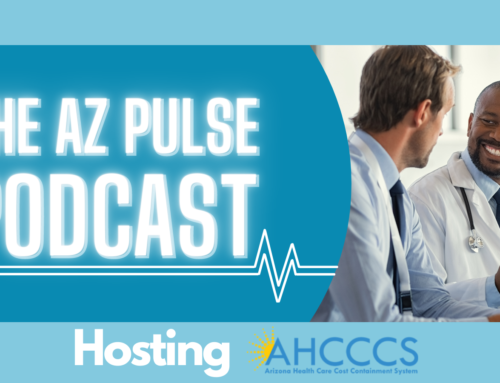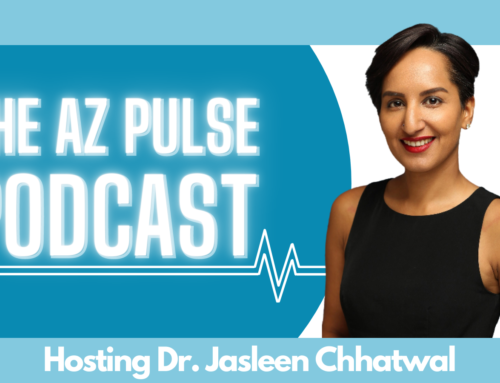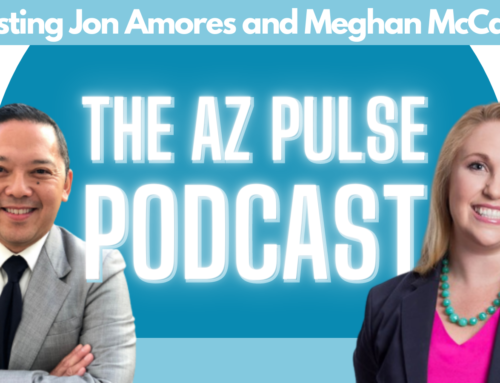In episode five of The Arizona Pulse Podcast, we have the pleasure of talking with Dr. Sarah Coles, a family medicine physician based in central Phoenix, about physician residency training. During her interview, we discuss how important residency training is to the practice of medicine, what patients can expect, and a little bit of advice for those starting residency this year.
Be sure to subscribe to this podcast and share it with a colleague today! You can also check us out online where we cover new and exciting information. Learn more by visiting www.AZpulse.org and be sure to follow us on Twitter and Facebook.
Intro
00:00:00 Dr. Sarah Coles
One of the big ones I think is running a practice, so knowing what the business side of medicine is and that would include both running a business yourself, but also how you interact with other components of the health care system.
00:00:14 Damien Johnson
Welcome everyone to episode four of The Arizona Pulse podcast, a podcast in support of the online digital magazine, The Arizona Pulse, produced by the Arizona Medical Association. My name is Damien Johnson and I’ll be your host.
00:00:28 Damien Johnson
In episode four, I have the pleasure of talking with Doctor Sarah Coles, a family medicine physician based here in Central Phoenix.
During her interview, we discuss physician residency training and how important it is to the practice of medicine. What patients can expect, and a little bit of advice for those starting residency this year.
Before we dive into our interview with Dr. Coles, we’d like to mention that this episode is brought to you by the Arizona Medical Association, otherwise known as ArMA. ArMA works to empower physicians, move medicine, and shape care. Visit AZmed.org to learn how physicians, fellows, residents and medical students can become a member. You will also find tons of resources available to both physicians and patients.
And now let’s jump right into our interview with Dr. Coles.
00:01:15 Damien Johnson
All right, everyone, welcome to episode four of The Arizona Pulse podcast. I am your host, Damien Johnson, and I have the pleasure of sitting down and chatting with Dr. Sarah Coles. Dr. Sarah Coles, welcome to the show!
00:01:30 Dr. Sarah Coles
Thank you so much for having me.
00:01:33 Damien Johnson
Why don’t we start off with just providing a little bit of background, doing an introduction for yourself, and your background as a physician here in Arizona?
00:01:41 Dr. Sarah Coles
Great so I am, I actually moved here when I was a kid, so I’m as close to native as you can be without actually being born here. And I went to high school just down the street from where I currently practice, so I am a family physician practicing at the University of Arizona College of Medicine – Phoenix Family Medicine residency at Banner University Medical Center, Phoenix. It’s a bit of a mouthful. I was really fortunate as well because I attended medical school here in Phoenix at the University of Arizona, College of Medicine, Phoenix, as part of their inaugural class.
00:02:13 Damien Johnson
So the Phoenix campus for U of A is a fairly new campus, right?
00:02:18 Dr. Sarah Coles
Yeah, we’re pretty much brand new. The first class, which was my class, started in 2007.
00:02:22 Damien Johnson
OK, so let’s just dive in. As a physician, you deal a lot with resident education. That’s what we’re here to talk about today, especially given the time that this episode is going to be coming out, there will be thousands of newly trained MDs having just graduated and started their residency on July 1st. What is one word of advice that you would give to this group of individuals?
00:02:50 Dr. Sarah Coles
It’s so tough ’cause there’s so much advice I want to give these folks, but I think if I only had one word, it would probably breathe. Starting residency is a really wonderful and intense time for our new resident graduates, which are called interns. So interns are starting their residency in their very first year of training. They’ve completed their four years of medical school already and have their MD or DO degree, but are now starting their journey to become trained in whatever specialty that they would like to pursue in the future.
For me, I work in the family medicine residency, and I train residents who are interested in becoming board-certified family physicians. So, those interns are just fresh out of medical school and super excited to see their first patients in practice as a doctor. But it’s also a really scary time. This is something they’ve been training, for many of them, for their whole lives, but at least the last four years in medical school, and so they’re really thrilled to be there and a little bit nervous.
So, my advice to them is to know it’s going to be OK. You’re well-trained, you’re well-supervised, the patients are delightful and really want to help you learn as well, and that you’re going to do an amazing job and just be fantastic physicians for Arizona in the future.
00:04:04 Damien Johnson
Yeah, that’s an interesting point that you bring up about the patients. That was actually going to be one of the questions I was going to ask you after this was, do you see a good response from patients with physicians in training. They’re welcoming to them? No, no issues really there?
00:04:19 Dr. Sarah Coles
Absolutely. I think most patients really don’t mind working with residents and interns, physicians in training, and medical students as well.
I’ve practiced in a residency setting, so all of my patients know that this is a teaching setting, and many of my patients have grown up with me. So started with me when I was an intern and have stuck with me even now. A lot of my patients actually take pride in watching my progression and growth s a physician. I had one just the other day tell me how proud he was that I am an attending physician and he remembers me back in my intern years and when I was a bit more nervous, so I think they really do enjoy that process.
I also think it gives them a lot of extra experience and extra expertise that is an added benefit to working with physicians in training, so they get the eyes and experience of the intern and the resident who is seeing them for whatever encounter that day. they also get the experience and added supervision of the attending or supervising doctor, who is helping, and all of that kind of up-to-date medical information, cutting edge technology, and new ideas that are percolating in medical education settings, so it really is a cool place to get care.
00:05:34 Damien Johnson
That’s some, that’s some great insight. I appreciate you providing that and you know, I think that one thing to also remember, and you mentioned it too, that was that the physicians they have around them as well to supervise. I mean, individuals like yourself watching over their backs, making sure they’re understanding and catching things they may not be and really relying upon you as the instructor or their resident training provider that they’re really going to rely on you heavily over those few years, so I bet some great relationships come out of this, too.
00:06:05 Dr. Sarah Coles
Oh absolutely.
00:06:06 Damien Johnson
Let’s go and jump into my next question here. Residents are actual doctors, correct?
00:06:11 Dr. Sarah Coles
Absolutely they are real, honest-to-goodness doctors.
00:06:15 Damien Johnson
So how can we best describe that to the general public?
00:06:19 Dr. Sarah Coles
I think it is a confusing process for the general public, how we get trained to become a physician, and I think most people don’t really know what the process is and that’s fine. Why would you? You don’t need to know that most of the time.
So, the process is this, we go to medical school, either an MD or a DO school for at least four years to be getting your basic training.
After that, you pick what kind of specialty you would like to go into. So for me, I chose family medicine, but there are tons of specialties out there. Surgery, obstetrics and gynecology, pediatrics, you name it, there’s a specialty.
So, after you graduate medical school and choose that specialty, you enter residency where you get that specialized training to become that type of physician. The length of residency training depends on what you’re doing, how long it goes. So for family medicine, it’s three years. For other specialties, it might be more. It depends on what kind of training you’re getting. Those folks are real doctors that have their MD or DO and are very well trained, but they’re just getting extra experience in that particular specialty for what they’re going to be doing for the rest of their careers.
After that, they might do what’s called a fellowship and get even more specialized training, which can last anywhere from one to a few years, and then after that, they become what’s called an attending, and an attending is a supervising doctor and a doctor who is practicing independently and is board-certified and is out in the community and no longer requires any supervision.
00:07:46 Damien Johnson
So, let’s flip roles a little bit here now. Thank you for that explanation. So, as a physician who’s starting residency walking in on their first day, how would they best explain to the patients on where they’re at, and would you ask them to describe it the way you do? Or would you ask them to change up some of the verbiage a little bit? How would they best describe it to patients as they’re walking into rooms?
00:08:08 Dr. Sarah Coles
Yeah, so if I were still a resident, which is not that long ago, I would describe it to the patients who I am seeing like this. I’d walk into the room and introduce myself, “Hi, I’m Dr. Coles. I am one of the resident physicians here. That means that I have completed medical school and am now in training to become a family physician. I’m going to be the one taking care of you today and I’m going to work with my supervising doctor to make sure that we’ve addressed all of your concerns and that we’ve hit all the pieces that we need to hit to make sure you get excellent care.
00:08:39 Damien Johnson
That’s a great explanation, thank you.
So how long have you been in your role training residents?
00:08:46 Dr. Sarah Coles
This will be my seventh year as a medical educator in a residency, yes.
00:08:50 Damien Johnson
And so, as as an educator, and I mean fairly, I mean in comparison to an entire career, you’re still somewhat within the last decade of having started in this role, what do you think would be or what would you describe as some of the big gaps between medical school training and preparing for residency?
00:09:16 Dr. Sarah Coles
I think that medical schools really do a wonderful job of preparing their students to be excellent residents and physicians in the communities that they’re serving. But I do think that there are some gaps in medical school training that we then work to address in residency training.
One of the big ones, I think, is running a practice. So knowing what the business side of medicine is, and would include both running a business yourself, but also how you interact with other components of the healthcare system. Things like the insurance companies, government organizations, healthcare systems, all of those kinds of pieces that really do play a significant role in how healthcare is delivered, not just how healthcare is delivered by the individual, but how health care is delivered by entire systems, and so that’s a piece that is sometimes really hard to teach in medical school, especially because our medical students aren’t always in just one place for a significant period of time, so sometimes it can be harder to figure out how all of those pieces interact together.
Another area that I think is a gap is how physicians play a role in the larger community and public health. That what we do in our clinic office setting, hospital, ER room, wherever we are is meaningful and important, certainly, but is not the be-all and end-all of healthcare, that most of health is really determined by what happens outside of healthcare walls. So what happens out in the community, things like transportation access, access to green space and leisure activities, food safety, housing security, structural and systemic racism, and other causes of disparities. All of that is a much bigger player in individuals’ health.
As physicians, we can play a key role in how to mitigate those factors and figure out how to help close some of those gaps for patients, and what we’re really talking about is helping our medical students, residents, and then ultimately all of our practicing physicians address and assess their social determinants of health and medical schools are improving in this all of the time, but this is something that we certainly need to continue to work on to make sure that we’re creating the physicians that we need for tomorrow.
00:11:33 Damien Johnson
No, that’s a good point. You bring up the social determinants of health and in last month’s episode, we had a lengthy conversation with Dr. Priya Radhakrishnan about that and her training over there at Honor Health, and how we’ve seen a big focus on that even in the spotlight on social determinants with access to care for COVID, you know during the COVID-19 pandemic and even access to getting the vaccines as well and trying to meet individuals in the community.
I want to talk about another point though that you brought up early on in your answer and the business side of things. It’s we sometimes forget that private practices are the backbones to our small business community, keeping us together and keeping us healthy but also trying to run a business and keep their doors open as well.
Can you describe some of the experiences that residents get in how to run a business? Do they get to be involved with some private practices so they get to shadow some individuals? What kind of training and eye-opening experiences do they get?
00:12:38 Dr. Sarah Coles
Yeah, absolutely, and every residency is a little bit different on how they teach this, but we do want our residents to know the business side of medicine, because it is an important part of our economic health in the state of Arizona as well as, we need to make sure that we can actually provide care to our patients, we need to keep our lights on and pay our staff so we need to run an appropriate business.
So in our practice setting, for example, our residents do significant training on that kind of practice management business side. They spend some time with practice physicians, or physicians practicing in alternative care models, so things like concierge medicine or direct primary care or in other healthcare systems such as Indian Health Services or Veterans Affairs where it runs a little bit different. We also do a lot of learning activities with our residents about how businesses are run. So helping them think through contract negotiation, running that balance sheet, making sure that you’re paying appropriately, finding out what is competitive market rates, all of these kinds of things that you probably don’t think about until you actually have to run that business.
We ask our residents to participate in our practice management so to look at our balance sheets, to look at our net promoter scores, to think about costs and savings opportunities, and where is there waste? What could we be doing more efficiently? What could we be doing better?
We asked them to work with our insurance companies to figure out how those kinds of contracts and negotiations take place and areas that we could collaborate with our insurance companies to both improve our care as well as to make sure that our business model is sustainable.
So we’d like to have it ideally be as many different ways as we can ’cause everybody learns a little bit differently, and then we do expect some really hands-on applications so they do their own billing and coding. They are responsible for knowing about their RVU generation and their productivity. They need to know their quality metrics and how that impacts the payment, both for our practice and themselves, as potentially an individual provider in the future, so we really want to make sure that they have these kinds of micro experiences, and then tie them into that larger business practice that we are running as well.
00:14:56 Damien Johnson
Sounds like it’s an all-hands-on-deck type of experience. I mean you’ve got, you’re working motors left and right in the brain, I mean ’cause you go to school for medical school for four years, you learn about all the different ways of how to take care of a patient, how to treat them medically, and how the body works. And then you get thrown out into the real world and residency, start residency to try and learn how to apply the things you learned in medical school, but then also on top of that, learn how to check yourself. Learn how to code, learn how to how to bill, learn how to run a practice, to run a business. It seems, I mean, I could see where all those hours and endless hours that they participate in over those years of residency really come in handy for learning all these different things.
00:15:40 Dr. Sarah Coles
Yeah, residency is no small feat. It is definitely a lot of blood, sweat, and tears but mostly joyful moments, I think. Really positive learning experiences, really wonderful opportunities to engage and connect with our patients and our communities. But there is a lot to learn, not just the medical stuff; all the other pieces of healthcare that we really need to become masters of to provide good care.
00:16:05 Damien Johnson
So, graduate medical education is something that is kind of been a hot topic down at the legislature. You know, here at the Arizona Medical Association where we produce this podcast and The AZ Pulse website, we have a lot of focus on advocacy work and the lobbying efforts on behalf of both patients and physicians in our state, and one of the big focuses of the last few years has been graduate medical education. Is that something that you see a need in as well in your position? A need for more funding, more dollars to support physician training across our state?
00:16:42 Dr. Sarah Coles
Absolutely, and I’m so grateful to the Arizona Medical Association for all of the work that they’ve done around graduate medical education and really advocating for this critically important area for the state of Arizona.
Graduate medical education is the term we use to describe post-medical school training, so residency and fellowship, and we know that there is not enough graduate medical education opportunities in the state of Arizona.
Most people will practice where they do their graduate medical education. So, if you train in Arizona, you’re very likely to stay in Arizona. We lose a fair number of our students every year when they graduate to go do their training elsewhere, which means that the likelihood that they come back is lessened. And really, we want to keep our excellent, amazing physicians here in Arizona for Arizonans.
Arizona has some really significant and critical physician shortages, particularly in the area of primary care, so family medicine, general internal medicine, and general pediatrics, as well as psychiatric care and a number of other specialties and areas. These shortages reduce the quality of care that is available for Arizonans. If you don’t have access to the physician that you need and the time that you need it, you are likely to have worse outcomes, so increased disparities.
We know that we need more folks for Arizona, not just in our rural communities, but also in our urban inner cities as well. So this is a critically important part of Arizona’s mission and ArMA’s mission, and I’m really grateful that we continue to push for more GME spots and funding.
00:18:21 Damien Johnson
Yeah, I remember reading somewhere about what is some 70% of residents stay where they are at or where they do their training. So, it only makes sense to increase the amount of GME slots and educational opportunities for post-graduation training to be in our state. I mean, what was last year? We grew by 200,000 people in population in one year from individuals moving from out-of-state into Arizona, and we for sure do not have enough doctors to keep up with that growth rate, and so, I think this is a great opportunity to continue to provide that training, provide those slots, and continue to make sure Arizonans are taken care of.
00:19:03 Dr. Sarah Coles
Absolutely, and we also need to focus not just on the number of slots that are available and funding, but to make sure that they’re going to the right thing so areas that Arizona really does need more of things like primary care, psychiatry, general surgery to make sure that we’re treating the needs of our of state.
We also know that with graduate medical education, you’re more likely to stay, not just in the state that you practice, but in the type of community that you practice. So, if you train in a rural area, you’re more likely to practice in a rural area. If you train in an urban, underserved area, you’re more likely to practice in an urban, underserved area. So, we want to make sure that we build our graduate medical education opportunities in the areas that have the highest need.
00:19:44 Damien Johnson
Great thank you, thank you for that information.
Alright, Dr. Coles. Well, thank you very much for taking the time to interview with us today. It has been a true pleasure and it was an exciting topic to talk about as well. I definitely want to wish the best of luck to all of those starting their residency this year, or continuing their residency, or even congratulations to those who are finishing and moving on to the next phase of their career. But most importantly, Dr. Coles, thank you for your time and for participating in this interview today.
00:20:19 Dr. Sarah Coles
Thank you so much for having me. It’s been a joy.
Outro
00:20:21 Damien Johnson
Thank you everyone for listening to episode four of The Arizona Pulse podcast. We hope you found the conversation not only enjoyable but also informative.
We would like to quickly remind you that this episode is brought to you by the Arizona Medical Association. Visit AZmed.org to learn more.
And last but not least, be sure to check out our online magazine, The Arizona Pulse, by visiting AZpulse.org. Here you will find articles, episodes, and information on the pulse of Arizona’s healthcare industry. Be sure to subscribe to this podcast for alerts on future episodes, share this episode with a colleague, and show your support on social media.
You can find us on Facebook, Twitter, and Instagram. We’ll catch you on our next episode. Stay safe and be well.
Check out our other latest articles!
Seven Questions with Medical Educator, Dr. Jennifer Hartmark-Hill
Written by: Chris Bailey, MD The Arizona Medical Association [...]
The AZ Pulse Podcast, Episode 2: Interviewing Dr. Jennifer Hartmark-Hill
In the second episode of The Arizona Pulse [...]
Advertorial: New Care Coordination Program Helps Doctors with Patient Support
Written by: Jennifer Urbonas UnitedHealthcare has introduced a new [...]
Six Questions with Family Medicine Physician, Dr. Carl Bryce
Written by Juliana Stanley, MBA, CMPE [...]
The AZ Pulse Podcast, Episode 1: Talking with General Surgeon, Dr. Ross Goldberg
In our first official episode of The Arizona [...]
Honoring the 2021 ArMA Healthcare Awards Winners
For over thirty years, the Arizona Medical Association (ArMA) [...]
